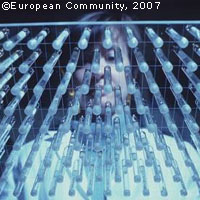EU-funded researchers call for action on stem cell legislation
Stem cell researchers from two major, EU-funded projects are calling for action to remove the political and legislative barriers that are holding back joint research in the field in Europe. Scientists from the EuroStemCell and ESTOOLS projects, both of which are funded under the Sixth Framework Programme (FP6), set out their arguments in a joint statement sent to Members of the European Parliament. 'Obstacles to research in some partner countries, in particular Germany and Italy, create problems for the free circulation of ideas and people in the European Research Area,' the statement reads. 'This will delay discovery of new knowledge and the development of biomedical and therapeutic applications, the ultimate aims of Europe's support for our research.' Currently, German law bans the production of human embryonic stem cells in the country, and the import of stem cell lines created after 1 January 2002 is prohibited. However, cell lines dating from before 2002 were not obtained using the most up-to-date techniques and are often contaminated with viruses and animal cells. Researchers who flout these rules face the threat of prosecution. Although Italian law forbids the creation of new human embryonic stem cell lines, work on existing cell lines is permitted. However, in practice the country's public funding bodies only allocate resources to research involving adult human stem cells. 'We urge Europe's legislators and administrators, who have the power to change the situation, especially in Germany and Italy, to act to enable all European scientists to work freely together in the pursuit of knowledge without fear of legal action or loss of research funding,' the researchers write in their statement. In their statement, the project consortia highlight the impacts these restrictions have on their work. For example, under the ESTOOLS project partners regularly visit partner laboratories to compare different human embryonic stem cell lines. German scientists are wary of taking part in exchange visits to partner laboratories where new stem cells lines are used because they are unclear whether they could be prosecuted on their return to Germany. Similarly, German and Italian researchers are unsure as to whether they can use national or university funds to pay for their participation in the EuroStemCell summer school. Furthermore, both projects are concerned that if a German partner takes on a position of responsibility, for example by heading up a work package, he or she could be open to legal action in Germany. 'EuroStemCell scientists from across Europe are working together to compare embryonic and tissue stem cells and their potential for medical applications,' commented Austin Smith of the Wellcome Trust Centre for Stem Cell Research. 'However, the situations in Germany and Italy present constant difficulties because our colleagues in these countries may be punished for taking part in research activities of the project.' 'Despite common funding through the Sixth and Seventh Framework [Programmes] of the European Commission, current legislation means that scientists within Europe cannot freely exchange personnel and cell lines,' added ESTOOLS Project Coordinator Professor Peter Andrews of the University of Sheffield. 'This has huge consequences for stem cell research in Europe, limiting the ability of researchers with different expertise in different countries to work together for the common good.' The joint statement is the latest in a long line of actions calling for a change in the laws of Germany and Italy regarding stem cell research. In November last year, the German Research Foundation (DFG) called for a revision of the 2002 Stem Cell Act. In particular, the DFG proposed a repeal of the cut-off date rule, to allow researchers to use newer cell lines, and the lifting of the threat of prosecution for scientists involved in international collaborations or working in overseas laboratories which use cell lines which are banned in Germany. Earlier this month Italian scientists also issued a 'manifesto' for scientific research on embryonic stem cells which asks for funding to be made more easily available for such research. 'We seek a reorientation of the currently imbalanced situation, achievable by the resumption of public funding for research on embryonic stem cells that are already available, which is permitted by Italian law and is a basic feature of the transparent regulation applied in most European countries,' the authors state.
Countries
Germany, Italy



